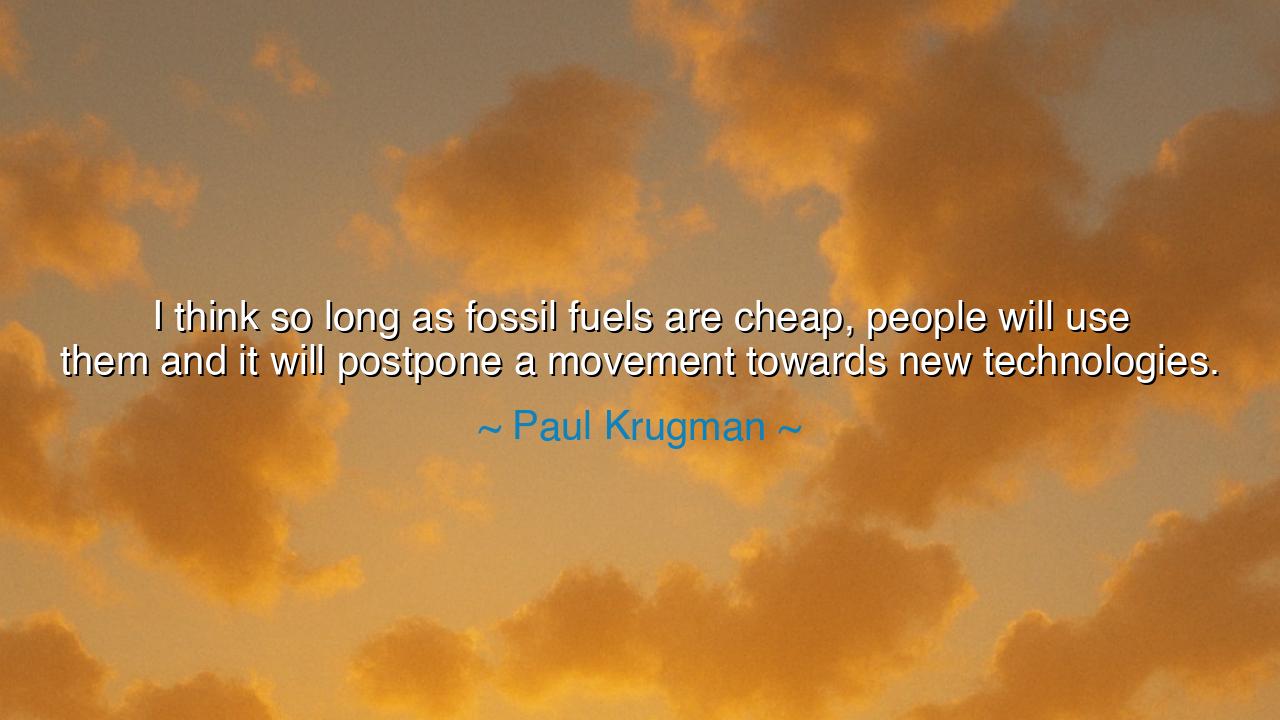
I think so long as fossil fuels are cheap, people will use them
I think so long as fossil fuels are cheap, people will use them and it will postpone a movement towards new technologies.






When Paul Krugman declared, “I think so long as fossil fuels are cheap, people will use them and it will postpone a movement towards new technologies,” he spoke with the clarity of one who sees beyond the present hour and into the long unfolding of destiny. These words are not simply a reflection on economics—they are a lament, a warning, and a mirror held up to human nature itself. For in them lies the eternal struggle between comfort and progress, between the ease of the known and the courage to seek what is new.
The origin of this truth lies in the story of civilization’s appetite for power. Since the dawn of the Industrial Age, humankind has drawn its strength from the depths of the earth—coal, oil, gas—the black blood of an ancient world. These fossil fuels, born from the decay of forgotten ages, have built empires and lit cities; they have carried ships across oceans and men across continents. Yet their abundance and cheapness have also lulled humanity into complacency. What is easy is always tempting, and what is profitable is hard to abandon. Thus, the world clings to the past while the future waits, unfulfilled.
Krugman, an economist by craft but a philosopher in spirit, understood that price often governs purpose. When the old path remains cheaper, people rarely venture into the unknown. This is not simply a matter of money—it is a reflection of human habit. The same truth that binds the market binds the soul: so long as comfort is available, innovation sleeps. Only when necessity awakens, when the old ways falter, do people reach toward the light of new technologies, of cleaner power and wiser living.
History is filled with such moments. Consider the tale of the whale oil age in the nineteenth century. For generations, the lamps of the world burned with oil drawn from the bodies of whales. It was dangerous, costly, and cruel, but it endured—until the wells of Pennsylvania struck a new substance: petroleum. Once this cheaper energy appeared, humanity turned its back on the harpoon and the sea. Yet what began as progress soon revealed its own peril, for in turning from one resource to another, we merely changed the name of our dependence, not its nature. The lesson is clear: true progress demands more than replacement—it demands transformation.
So too, in our own age, we stand upon the threshold of another reckoning. The cheapness of fossil fuels blinds the eye and weakens the will. It whispers to us, “Not yet—tomorrow we shall change.” But tomorrow becomes a lifetime, and the earth grows weary beneath our delay. The skies grow dim with smoke, the oceans rise with sorrow, and the forests fall in silence. We who once mastered fire now find ourselves enslaved by it. Krugman’s words are a call to awaken—to see that the price of convenience is not measured in coins, but in the future itself.
And yet, hope remains, for necessity has always been the mother of invention. As the cost of comfort rises and the planet cries for relief, the spirit of innovation stirs once more. Across the world, minds labor to harness the sun, the wind, and the tides. They seek energy not of destruction, but of renewal—technologies that heal rather than consume. This is the path of wisdom: to move not when forced by crisis, but guided by foresight. To choose the harder road before the easy one collapses beneath our feet.
The teaching of Krugman’s words is thus twofold: first, that ease is the enemy of progress; and second, that wisdom lies in acting before necessity demands it. Let each person, and each nation, remember this: what is cheap today may cost the world tomorrow. Therefore, let us invest not in what is convenient, but in what is enduring. Let us turn our minds to renewal, our hands to creation, and our hearts to responsibility.
For in the end, the worth of a generation is not measured by the wealth it gains, but by the world it leaves behind. Let us then rise above the seduction of the easy flame, and kindle instead the eternal fire of progress—the light of courage, learning, and change. Only then shall we prove worthy of the earth that bore us, and of the heavens that yet await our care.






AAdministratorAdministrator
Welcome, honored guests. Please leave a comment, we will respond soon